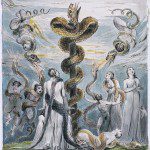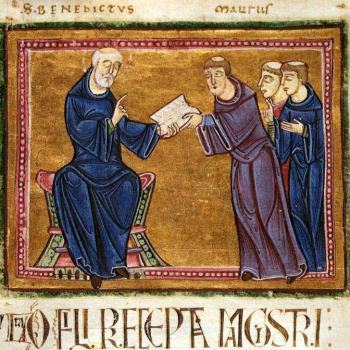![Saint Patrick Stained Glass Window. By Sicarr (Flickr) [CC BY 2.0 (http://creativecommons.org/licenses/by/2.0)], via Wikimedia Commons](https://wp-media.patheos.com/blogs/sites/637/2017/03/Saint_Patrick_window-194x300.jpg)
Most glorious art Thou, Christ our God/ Who didst establish our Father Patrick/ as the Enlightener of the Irish and a torch-bearer on earth,/ and through him didst guide many to the true Faith./ Most Compassionate One, glory to Thee (Troparion of St Patrick).
We are all pilgrims in the world. We are here for a short time before we leave it in our death. Some people might not want to accept this, and so will hold on to the ground they stand on as long and hard as they can, but in the end, old age and death will come to them as well, and since they have not set their sight for what is to come next in our communal pilgrimage to eternity, they will be ill-prepared for the journey to come. Those who are wise will realize the good of the earth we find ourselves upon, and will treat it with respect, recognizing its worth because it was made by God, but they will not attach themselves to it, trying to hold themselves to it beyond reason, because they realize their destination is to be had in the transcendent glory of the kingdom of heaven.
Note well, so long as our journey takes place in temporality, and we live in God’s beautiful creation, we are expected not only to treat it well, but to do what we can to make it better. The earth shall be joined with heaven, just as man was assumed by God in Jesus Christ. This means that what is done on earth shall be taken in and assumed by God into the glory of eternity. What we do will have an eternal significance, for God has made room for us to interact with his creation, and to distribute through our interactions with it, his grace so that we become mediators between God and creation, even as Jesus in his person is the mediator between God and us.
Some of us are called more to realize the significance of our life as a pilgrimage more than others, so that some are to be constantly on the move while on the earth, having no place serve as their home for long, while others are called to experience the pilgrimage in a more spiritual sense while they stay in one place for most or all of their lives. No matter where we are called, when we find the calling, when we find the good which we are supposed to do, we must hold firm to that duty no matter the trouble and difficulties we face, seeing that we do the will of God. We must put our trust in God, not ourselves, making the hardships a part of our pilgrimage to our heavenly home, and not their deterrence.
The greatness of this pilgrimage, the calling to follow the will of God wherever it shall take us despite our own hopes and fears, can be seen represented in the life of Abraham. In Abraham, we see the archetypal form of the pilgrim which we should all try to imitate and follow in our own unique ways; we see the kind of fidelity we must have with God in the hard times, as well as the joy, laughter, and happiness which we can find in life. We must not let the temporal pleasures, which can be seen as gifts of God, limit us and hold us back, but rather we must be willing to sacrifice them all for the sake of God, if we are asked to do so. If we do so, we will find those which were good and true will be preserved and protected by God, who will reward us for our fidelity and willingness to abandon all things and empty ourselves of all earthly glory. On the other hand, those things which were bad and ill for us, which we mistook to be good, will then be able to be cast aside for the idols they were, and we will find ourselves that much more open to the truth of God. Thus, we should see ourselves in the call of Abraham:
Now the LORD said to Abram, “Go from your country and your kindred and your father’s house to the land that I will show you. And I will make of you a great nation, and I will bless you, and make your name great, so that you will be a blessing. I will bless those who bless you, and him who curses you I will curse; and by you all the families of the earth shall bless themselves” (Gen. 12:1-3 RSV).
To be a pilgrim, we must be willing to deny ourselves of anything which will hinder our spiritual journey, so that we can receive grace and wisdom from God. For in self-affirmation, in self-will, we follow the path of pride with its disgrace, while if we are humble and willing to look past ourselves, beyond our self-will, we will be able to hear the call of wisdom, as Proverbs suggests: “When pride comes, then comes disgrace; but with the humble is wisdom” (Prov. 11:2 RSV).
Sometimes, our pride must be taken from us, as we find ourselves forced out of our stupor to become receptive of God’s grace. This is exactly how St. Patrick understood his calling. He was lifted up by God, outside of himself and his self-will, to find himself placed with a new people, a people which he came to know and love, so that he was to understand his purpose in life was to reach out to those same people with the Wisdom of God. Thus, in a letter of his which has been preserved, we read:
Did I come to Ireland without God, or according to the flesh? Who compelled me? I am bound by the Spirit not to see any of my kinsfolk. Is it of my own doing that I have holy mercy on the people who once took me captive and made away with the servants and maids of my father’s house? I was freeborn according to the flesh. I am the son of a decurion. But I sold my noble rank — I am neither ashamed nor sorry – for the good of others. Thus I am a servant in Christ to a foreign nation for the unspeakable glory of life everlasting which is in Christ Jesus our Lord. [1]
As a prideful young man, he found himself picked up and tossed away from his homeland, by the hand of God, so that he was like a chosen stone picked up and placed on high for the glory of God:
Whence, I, once rustic, exiled, unlearned, who does not know how to provide for the future, this at least I know most certainly that before I was humiliated I was like a stone lying in the deep mire; and He that is mighty came and in His mercy lifted me up, and raised me aloft, and placed me on the top of the wall. And therefore I ought to cry out aloud and so also render something to the Lord for His great benefits here and in eternity – benefits which the mind of men is unable to appraise.[2]
![St. Patrick Woodcut. By Michel Wolgemut, Wilhelm Pleydenwurff (Text: Hartmann Schedel) (scan from original book) [Public domain], via Wikimedia Commons](https://wp-media.patheos.com/blogs/sites/637/2017/03/Nuremberg_chronicles_f_145v_4-239x300.jpg)
[1] St. Patrick, “Letter to the Soldiers of Coroticus” The Works of St. Patrick; St. Secundus; Hymn on St. Patrick. trans. Ludwig Bieler, PhD (New York: Newman Press, 1953), 43-4.
[2] St. Patrick, Confessions in The Works of St. Patrick; St. Secundus; Hymn on St. Patrick. trans. Ludwig Bieler, PhD (New York: Newman Press, 1953), 24.
Stay in touch! Like A Little Bit of Nothing on Facebook:
A Little Bit of Nothing












